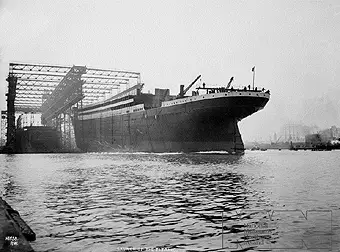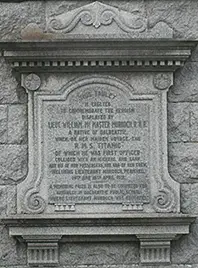1. Introduction
Hero, from the Greek: heros, a demigod, those whom the Gods defend; classically, the men of the Iliad.
Voltaire wrote that in metaphysics and in morals the Ancient World thought of everything; anyone who came after was merely a commentator. This is a commentary on heroism.
On May 31, 1911, the White Star Line's new ship was launched in Belfast. The name was not auspicious: Titanic, from the Titans, conceived of Heaven and Earth, magnificent, colossal, but suppressed for presumption by the Olympian deities, and banished to darkness. The editor of the Belfast Morning News knew his Greek mythology: on June 1, 1911, he protested calling a ship after ancient impieties. The editor felt that lightning strikes twice.

May 31, 1911, the Titanic is launched in Belfast.
Less than one year after the editor's protest, the Titanic came face to face in the dead of night with an iceberg already old on the day Agamemnon called for volunteers, and mere days into her service life vanished. Striking ice was not atypical; sinking because of it was. Why the Titanic was steaming at 21 or 22 knots in the midnight hours in an area where ice was known to be present, what route she was tracing and why, were questions only her log or her commander, Captain Edward J. Smith, could answer, and both were gone. Of her senior officers, who might be supposed to possess answers to questions the United States Senate desired to put, Chief Officer Henry Wilde and First Officer William McMaster Murdoch were also dead, and while Second Officer Charles Herbert Lightoller was alive, he had been asleep at the fatal moment, and in any event proved to be a witness whose memory was serpentine and opaque.
It was still an age in which men believed they knew the hand of a righteous God when they saw it. It was also one where the pagan classics were familiar to the well educated. When the prestigious Scotsman in Edinburgh printed a Press Association dispatch on April 18, 1912, asserting that the officers of the Titanic had "worked like Trojans" endeavoring to save passengers, perceptive readers in Christian Scotland understood this reference to courageous futility. Neptune had intervened in the Trojan War to engineer victory for the Greeks because he bore Troy a grudge. Like his home the sea, the god was unpredictably, lethally uncontrollable -- the commands of Zeus, like the snow that served Homer as metaphor, fell on the heavens and the earth alike, but not on Neptune. If this loss of the Twentieth Century ship with the Bronze Age name was not an act of the vindictive sea god, it was so near as to make no matter.
There had been and would be many sinkings more terrible than the Titanic but this singular loss had no one obvious cause but instead had about it a disparate collection of causes that might have been better described by Aeschylus than earnest public servants sitting on boards of inquiry. The bridge of the Titanic had become the fulcrum of a Greek tragedy. Those who had been appointed to command that bridge seemed in retrospect mere instruments of fate. St. Augustine, quoting Seneca, wrote in the City of God:
The Fates do lead the man that willing follows,
But the man that is unwilling, him they drag.
The second part of Seneca's statement was true of Second Officer Lightoller, whose escape from the Titanic appeared to be miraculous in the exact theological sense. But it was the first part that described Titanic's First Officer, William McMaster Murdoch. Officer of the Watch, and therefore the man actually in charge for the lethal seconds, Murdoch was central to what had happened. He had gone down with the ship in a great and terrible manner, and thus the debate over his commands which had failed to save the ship and his quality as a man went on of necessity by indirection and inference.

First Officer Murdoch's memorial
tablet in Dalbeattie, Scotland.
(Click to enlarge)
First Officer Murdoch had acquired an eerie immortality at the expense of his life, and by it appeared simultaneously a victim, a hero, a personification of his age, and a symbol in which other men might invest their own necessities: all requirements of the dramatic genre. He was, in hard fact, a private person unknown outside his own world of professional sailors and the green and pleasant village in the lowlands of Scotland where he had been born. And yet, so perfect was William McMaster Murdoch for the position he would occupy in the story of the Titanic as classical tragedy that he might have arrived from Central Casting.
Those who had known Murdoch from his childhood and who had shared his life in Dalbeattie judged him a hero of the highest moral and civic worth. To memorialize this they founded a school prize bearing his name, and placed a commemorative tablet at their Town Hall, both realized from public subscription a considerable undertaking for poor people in a harsh time. Dalbeattie drew its life from the Solway Firth and the rivers and ports that led down to it, and its citizens appreciated as thoroughly as the Admiralty in London the qualities a man needed to embrace a life spent at sea. Considered by those in a position to judge one of the finest officers in the British merchant service, Murdoch had been privately apprised by the White Star Line that he would be given the next available command. Born February 28, 1873, at Dalbeattie, Kirkcudbrightshire, age only 39 years and 46 days on the night he died, he belonged to a formidable Scots sea faring family that began in the most romantic seeming of all places, the Isle of Skye.
